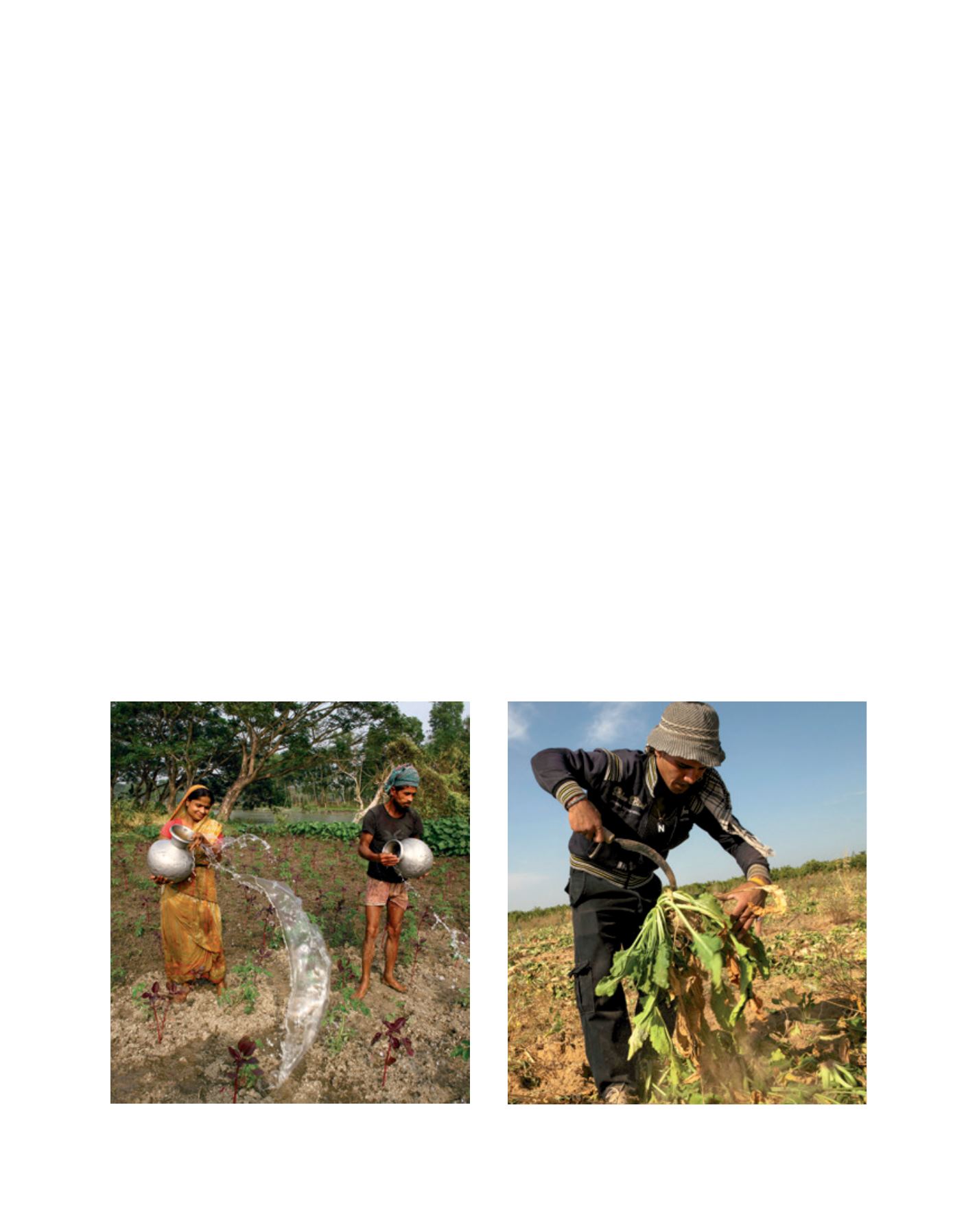

[
] 185
social services in rural areas, and access to resources, inputs,
financial services and markets. Most importantly, they need
secure access to land and they need to strengthen their own
producers’ organizations and cooperatives.
IFAD is committed to investing in family farmers, which
has multiple development benefits, particularly for poverty
reduction and the improvement of food security and nutri-
tion. IFAD investments in family farmers encompass all the
elements that make up the livelihoods of this diverse group
of women and men, including productivity, capacity building
of farmers’ organizations, infrastructure, women’s empower-
ment, access to financial services, access to markets, value
chains development and land policy.
Furthermore, IFAD is mainstreaming climate change
adaption in all these investment programmes. In 2012
IFAD launched the Adaptation for Smallholder Agriculture
Programme to channel climate and environmental finance to
smallholder farmers. The objective is to improve the capac-
ity of at least 8 million smallholder farmers to expand their
options in a rapidly changing environment. The programme
empowers community-based organizations to make use of new
climate risk management skills, information and technologies.
These include improved weather station networks, which can
provide farmers with more reliable seasonal forecasts and
cropping calendars; geographic information systems, which
improve understanding and monitoring of landscape use in
a changing environment; and economic valuation of climate
change impacts, which inform more robust policy decisions.
In The Gambia, the Participatory Integrated Watershed-
Management Project is building bridges to reclaim land.
Simple concrete bridges, built above the level of seasonal
floodwaters, have enabled farmers to access paddy fields even
in the rainy season, when previously fast-flowing muddy
water and rickety wooden bridges had restricted access to
only the strongest swimmers. Thus far, the project has helped
reclaim over 34,000 hectares of land for cultivation.
The Reconstruction and Rural Modernization Programme in El
Salvador contributed to the empowerment of women by provid-
ing technical and legal assistance to women’s groups to enable
them to participate in negotiations on land access agreements.
Political pressure to avoid land evictions was also applied in some
cases. The programme also gave women and men training to
develop business plans, which allowed them to obtain credit.
In Bangladesh, recognizing the need for innovation in
financial services, IFAD initiated a public-private partnership
with the Palli Karma-Sahayek Foundation, which in turn
channelled funds to microfinance partner organizations for
lending to smallholders. The organizations were trained in
agricultural financing and farmers were instructed in the use
of modern agricultural technologies. Over 200,000 smallhold-
ers accessed funds under the project, with a loan recovery rate
of 98 per cent. Annual household income was estimated to
have increased by 63 per cent as a result of the project.
Family farming, supported by suitable investments, public
policies and institutions, can contribute both directly, through
food production, and indirectly, through the income it generates
for smallholder farmers. This enables them to purchase more
varied and nutritious food. Successful development in small-
holder family farming will play a key role in reducing inequalities
between and within countries, which will be indispensable to
achieving development that is inclusive and sustainable.
IFAD’s experience has repeatedly shown that investment
in family farming is a key instrument to empower women.
For example, the Districts Livelihood Support Programme in
In Bangladesh, seasonal loans available through IFAD are used for the
purchase of agricultural products such as seeds, fertilizers and pesticides
Young people in Egypt have been provided with small plots of farmland by the
West Noubaria Rural Development Project
Image: IFAD/G.M.B.Akash
Image: IFAD/Marco Salustro
D
eep
R
oots
















